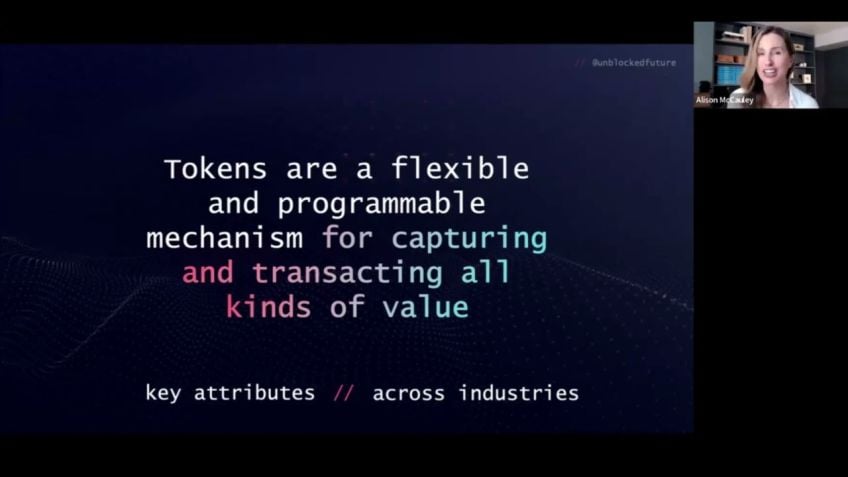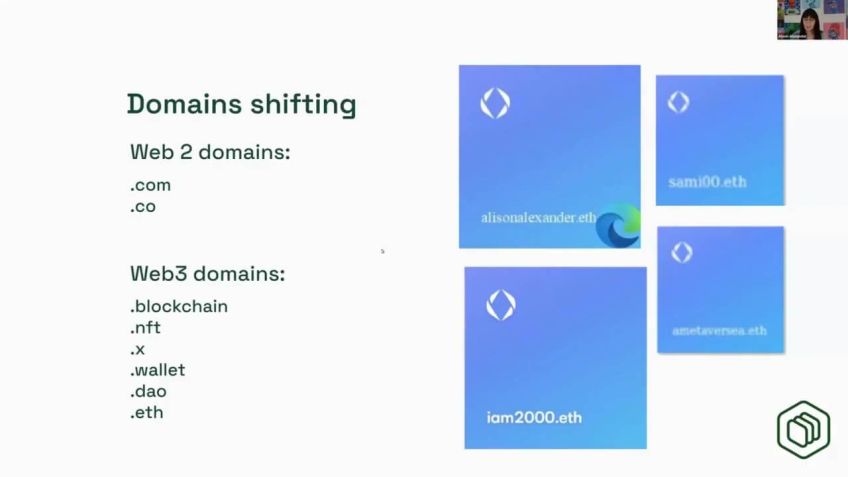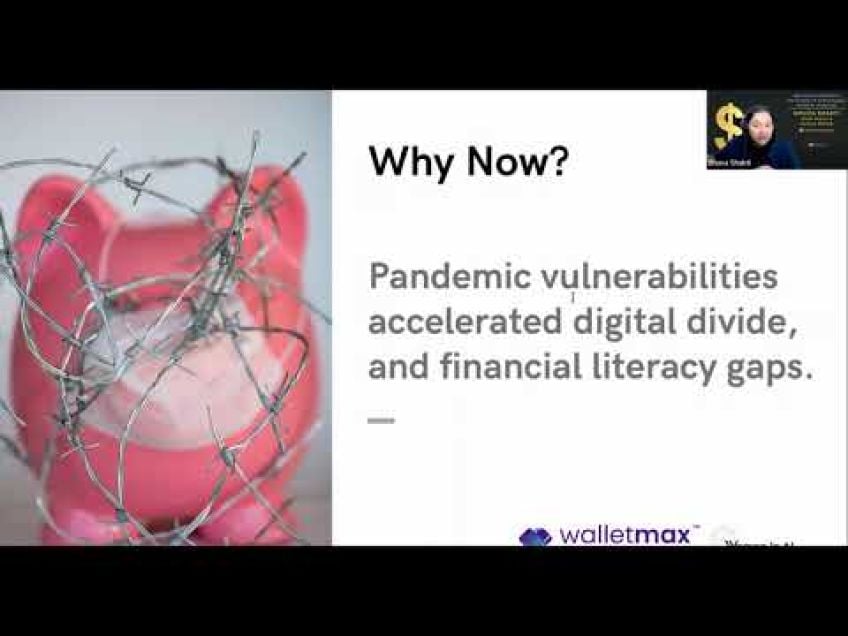Stepping into the Unknows we can trust! by Zara Zamani
Embracing the Unknown Future with Blockchain: A Roadmap to Understanding Trust Architecture
Hello, I'm Zara Zamani, the Chief Solutions Officer at Chrome. My professional domain includes being a Blockchain solution architect, a researcher, and a university lecturer in the adoption of Blockchain in small and medium enterprises. Today, we are going to explore an exciting topic that is currently taking the business world by storm - the adoption of blockchain and its role in defining our trust architecture.
Blockchain: Trust in the Unknown Future
In this digital era, we keep hearing about promising terminologies like Metas, NFTs, virtual life, and more. These new technologies may at times appear overwhelming and trigger a fair share of ambiguity, particularly concerning trust. You may find yourself questioning the viability of this obscure future and whether or not to place your trust in it. Herein, I want to delve into the context in which Blockchain as a technology impacts our society and scales trust.
However, to better understand the future impact of blockchain, we need to step back and look at history and what has lead us to where we are today.
Historical Analysis: Hierarchies, Bureaucracies, and Trust
Our modern society operates on structures born during the industrial revolution era, characterised by hierarchies and bureaucracies. The applications and technologies built during that era have resulted in additional layers of bureaucracy and hierarchy. A functioning model at the time, this system eventually began to fail us due to a lack of efficient trust and decision-making scalability.
Decentralizing Trust with Blockchain
- Failure of Hierarchical and Bureaucratic Structures: In traditional hierarchical structures, the decision-maker is often far from the source of information and the impact of the decision. Moreover, corruption becomes rampant as decision-makers increasingly distance themselves from the people they represent.
- A Leap into the Decentralized World: We are now transitioning into the era of "web 3.0" or the decentralized internet, breaking away from the requirement to trust a centralized entity. This world is powered by blockchain technology, wherein trust is shifted from an individual to a consensus mechanism.
- Blockchain's Potential: The major takeaway is that Blockchain technology helps to scale trust and decision-making, which forms the backbone of fair governance. It's not merely about democratizing finance or returning control of data to the hands of users. It offers an alternative to corruption and centralized control, thus transforming the way we treat and control data.
Stepping into a Trust-Enabled Future
Blockchain technology helps us stride confidently into an unknown future that we can inherently trust. Blockchain provides a model for distributed trust, negating the need for third-party entities or intermediaries. We stand before the precipice of a new world order, enabling us to control the decisions that directly impact our lives, reducing corruption while bolstering trust.
Final Thoughts
As we transition from web 2.0 to web 3.0, it'd be prudent to remember that while blockchain can offer a level of traceability and trust within its network, you must still exercise caution and educate yourself about potential risks during this transition period.
If you have further questions or wish to educate yourself more about this shift from web 2.0 to web 3.0 and how blockchain technology facilitates building trust, feel free to reach out to me on LinkedIn. Thank you, everyone, and good luck on your journey in this new era of the internet.
Video Transcription
Hi, everyone. I'm Zara. Uh Zara Zamani. I'm uh chief Solutions Officer at Chrome. Chrome Away is the Nordic leading Blockchain company. I'm a Blockchain solution architect in my expertise and I'm also a researcher and a university lecturer in adoption of Blockchain in small and medium enterprises.
Uh So I've basically been working with Blockchain since 2015. So I have the practical side of side of the coin, but I also have the academy side of the coin since I'm doing my phd in in Blockchain adoption as well. And I'm teaching that at the university scientifically. Uh But today we are here to talk about the unknown future that everyone is talking about. These days. We keep hearing about all these, you know, attractive um terminologies, Meras NFT virtual life and all these uh unknowns that for a lot of us is, is is new and uh it might uh come with a lot of um anxiety and stress like uh what is this unknown future. How can I trust? Do I even trust this unknown future? What is trust at all here? So today, I want to go into the context of in which Blockchain as a technology impacts our society. And so I'm not talking about much of the Blockchain architecture today, but I'm talking a lot about trust architecture today and looking at uh how this, how, how the trust works and how the trust scales in a society and how is that related to Blockchain? And how is that related to this unknown future that we are we are we are stepping into.
But before I actually talk about the future, I want to go a little bit back into the history and talk about the past and talk about where what has caused us to be where we are today. So if you look at um if you look at the history uh society, the way society operates today is based on structures that are initially built uh and are born in industrial revolution era, an industrial revolution era is a lot about hierarchies, a lot. It's a lot about bureaucracies and scaling the scaling in through, you know, applications and technologies that were built at in that era meant it meant eventually having more layers of bureaucracy and more layers of hierarchy, hierarchy. And this was nothing, it's nothing wrong with it.
This was working great. This has actually scaled trust, scaled human being to a big extent. But it has also reached to a point that our lives became extremely hierarchical that eventually started to fail us. Eventually, it started uh the all these hierarchical institutions that started to fail human being in many ways. Uh It failed to scale uh it and when we say scale, it failed to scale in terms of trust in terms of decision making. Um We kept uh not trusting banks. We uh we reach the point. We don't trust banks, we don't trust governments, we don't trust Facebook. We don't trust all bi big entities. Uh We keep hearing fake news, we don't trust the information that we receive. So it has done a great job up to a certain level, but from a certain level onwards, it has actually started to fail human being. And then when, when we look at what is happening there and how, how scaling trust has failed in hierarchical and broke ra um life or societies. And then we look at what we want for our society, which is a, a globalized uh society. We are talking about global globalization of information and there is a conflict here. How do, how are we going to handle this globalization of uh information? Uh If we can't really scale trust, if you can't scale decision making and how are these local institutions who have failed us?
Are going to handle this globalization of information? And you know, a lot of other other challenges like illegal legal challenges coming to the picture, et cetera. So this whole hierarchical but but why has it failed? Why, why has this hierarchical and bureaucratic structure has failed? The society's?
Um so far, the more hierarchical, the more pyramid looking structures uh exist in societies means the source of information is further away from uh decision maker from the decision maker itself. So decision maker is quite far from the source of information, but the decision maker is also quite far from the impact of the decision. So I as a decision maker in a hierarchical organization, hierarchical structure of society, I'm far from the source of information because there are different layers that this information is coming up to me. I'm also far from the impact of the decision I make and information and decision is built from down to top. But also this means eventually power is built from down to top right. Power is coming from down to top. So we have information, decision and power that are uh very distant from each other. And this means throughout the time, decision makers are getting further and further and further away from uh from the society or the community that they are making decision uh based on. And for right.
And this eventually means corruption, this this ends in corruption. The further I get away from the community that I am supposed to make decisions for or that I am supposed to make decision based on the data that I receive from the community. Then my decisions are influenced by other data. And that means corruption and the more corrupted the societies have become uh the more the trust has been tarnished and that is pretty much where we're standing today, centralized hierarchical bureaucratic structures of societies have have caused this distant corruption and tarnishing trust.
So it has not done, done good for us. But why, why are we even talking about this? We're talking about this because we want to relate this to how is that different from the, the, the, the structure of the world that we're stepping into? So if we go back again to the history 30 years ago and the unknown that we were stepping into, you know, giant tech companies coming into the picture, social media and a lot of fintech and I know applications in finances, et cetera technology was really booming and it was great.
But we were stepping into a very centralized world that we had to place our trust on an entity, we had to place our trust on an individual, but we no longer want to do so we no longer will to do so. And that's exactly where we need a flat, a peer to peer, uh a non hierarchical um platform or network that I do not need to know the the rest of the community. I do not need to trust the rest of the community. And this is pretty much what Blockchain technology is offering, right? If, if that a peer to peer to peer network, non hierarchical network that um that you don't need to, you don't know all, all the people who are all the entities or individuals who are in the network. But also you, you, you uh move your trust uh remove a person to a construct, whether be it a mathematical or a logical construct construct that actually governs um the uh the network, which means you, you replace the trust that you have on a person or an on uh on an entity with a construct, which is, which is what we call a consensus mechanism in Blockchain technology.
So what does this mean? This means eventually you are now stepping with vey and metaverse and all these applications that are being introduced to you, to us, to all of us, we are now stepping into a world that it is no longer centralized. We no longer need to, to place our trust in an organization. But now we are, we are replacing that trusting an entity with uh a construct, a consensus mechanism, a technology that actually governs um governs the the network or we use a network as a model for governance that actually can now scale. So the biggest advance that the Blockchain technology will provide to us in this uh coming unknown future is is not about uh democratizing finance in industry. It's not about uh cryptocurrencies, applications and, and it's, it's not about, you know, uh giving uh your power of ownership of your data back to you. The the biggest advantage is actually scaling trust and decision making. And as a result of the scaling trust and decision making.
That is exactly what uh what we receive, we will receive back the ownership of our own data, we will receive, we will, we will receive the share of the economy that we are not part of today. So, so by placing that by replacing that trust on an individual or an entity with, with the uh construct or consensus that is governing the network, now, we can uh scale trust and decision making tremendously. Now, in this unknown future that we are stepping into. And, and that means we will be able to replace centralized organizations today with decentralized organizations without the centralized autonomous organizations that are coming up or that already exist in. Uh however, uh and that means there is no more a director or a group of or, or a board of directors uh who are, who are making decisions, they comp uh uh a company and organization can have millions of directors and millions of shareholders and billions of shareholders that are actually building an organization together and are making decisions together.
And that means the source of information is getting closer and closer to the decision maker and the decision maker is also getting closer and closer to, to the uh to the people who this decision is impacting their life and majority of the time is the people themselves. So we are making decisions for our lives. We are making decisions that are impacting our lives. Directly. And the more we close this gap, the less corruption we will have. And plus the fact that Blockchain technology is architecture in a way that you cannot manipulate with data, you can is irreversible, it's immutable, that adds on top of that. And therefore the we minimize the corruption technology that the future tech that the uh the corruption uh by the technology that the future is the unknown future that we're talking about today is built on. And that means eventually more trust, the less the corruption, eventually you can trust that network more and more and more. And so the major advantage here is or the major uh takeaway here is that we are stepping now with the world of metaverse decentralized world or um web tree world, which is the internet based on Blockchain technology.
We are stepping into a world that trust and this decision making is scaled and eventually um we make a big change in how our data is treated today. So our data is treated today as um as a ST a store of value or a medium of exchange or unit of analysis. But also a lot of decentralized entities uh have added system of control over that. And now we're eliminating that and giving that control back to the the whole network. So you are making decisions uh for your own data, you're controlling your own data. And there there is no centralized system of control. So having said all of that uh by using uh Blockchain tech technology by taking, by taking advantage of Blockchain technology building the mewas and virtual worlds on Blockchain technology. We're stepping into a future that uh we don't even need no longer to think whether we can trust it or not. And it's by default uh um a network that is uh governing um governing that and, and that is basically by default, trust you, you're uh we call it a trust less operation because the trust element is uh and is distributed among the network.
And this network, they don't know each other. They don't, uh they don't need to know even each other. And as long as they're all agreeing on what um what decision needs to be made, then they go ahead with it and they make the decisions you make the decisions basically that are impacting your life immediately yourself. So having uh to, to wrap up and probably even we can look at uh the questions I would say uh the major difference between stepping into web two and web three is when you, when we were stepping into Web T web two, we were risking our uh life with giving too much of control of it to centralized entities while, and, and have you had to try banks, we had to place trust in, in centralized organizations where, whereas by stepping into, we, we no longer to play, need to place that trust.
And uh we are stepping into an unknown rule that we can by default trust because it's built on, on a technology that is by default trusted. So we can um we can have a look at the questions as we have five minutes. Uh Do you think that this centralized world might threaten deeply rooted banks and uh borders? For sure, for sure, not only ba banks and uh borders, you know, it threatens any entity that is empowered by centralization and centralization means control, any entity that uh would, would want to keep control over end users, data and end users life would be threatened. Banks, um financial institutions, governments, legal institutions, um um European Union uh universities, any central majority A as I said to our today's uh societies is structured around hierarchical bureaucratic centralization organizations as it's coming from industrial revolution uh time. So yes. Uh could that risk uh stalling this progress?
Um Both. Yes and no. Uh it did slow the adoption uh uh for, for, for some time. Uh However, I would say now the awareness among um uh a lot of um organizations is much higher than it was before. If you look at the uh if you look at the economy of Europe specifically because my scientific research is on smaller and medium sized companies, 99% of the economy of eu comes from a small or medium size companies and these are small and medium sized companies. Um They are much more flat and less centralized. And that means it can actually, while they buy the idea, once they buy the idea, then the speed of adoption forces the centralized and bigger entities to, to join uh the pack as well. I would say. So. Is there any other question? Yeah. Thank you, Maria for, for your questions. If there's any other question, I would be happy. Let me go to Q and A actually. OK. Uh No, I can see that the questions are only in the chat. Um So um we have two more minutes. So I would probably wrap up this session by saying that uh uh while I have mentioned that we are stepping into with, with vector and Metaverse, we are stepping into an unknown future that you can trust. Uh You have to keep in mind the trust that the trust element that I talk about is about the unchain, you know, the, the applications that are on Blockchain.
However, when we are taking the lead from web two to web through this transition will take some time and there is a lot of, you know, integrated applications that is web two Element street and web three element Street. Like when it comes to cryptocurrencies, you have a lot of wallets that are off the chain. So that doesn't mean that you can by default, trust anywhere, anything around it, but you can trust anything that is on the chain. So that, that is what you can more or less trust uh mostly, but you have to be very, very smart. And um also, you know, do a lot of uh self learning and education around it. There's also risks around it when you are taking the lead from Web two to Web three. But, but um I would say we need to, to worry less in this transition compared to when we did the transition 30 years ago from Web one to Web two with that. Thank you very much. And um I wish all of you who are taking the lead to Web three success and you can always reach out to me on linkedin and find me on linkedin. And if you have any further questions about this, thank you, everyone.





